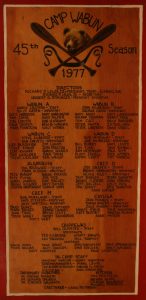
Coeducation camps offering programs for both boys and girls did not emerge as a dominant trend in Ontario youth camping until after the Second World War. During the interwar years, the earliest camps to embrace co-ed programming in Ontario were Jewish camps, often resulting in sexist and anti-Semitic push back from the wider camping community. A decade later, the rise of co-ed camps throughout the province would reflect a wider shift in popular understandings of youth development in the middle of the twentieth century. In previous decades, single-sex programming appeared to be the most conducive to proper childhood development; however, in the 1950s this perspective shifted to one asserted that facilitated co-ed environments were places to teach youth how to interact with the opposite gender, a skill that was viewed as critical to adolescent development. As Sharon Wall points out, the logic of the first wave of co-ed camps was fundamentally heterosexual—facilitated interaction between the genders taught young people how to interact in cohesive units, ensuring the future success of heterosexual marriages.1 Interestingly, in my personal research, camp directors more often cited embracing co-ed programming as a result of wanting to provide camping experiences for children of both genders within their own family, or the families of camp alumnae.2
In the early years, many co-ed camps emphasized the need for gender segregation at camp. It was not uncommon for boys’ camps to establish “sister” camps on entirely separate islands. Later camps embraced more interaction between boys and girls in camp facilities and activities; however, camps almost always required separate boarding facilities for boys and girls. Within canoe tripping camps, gender separation often occurred through single-gender trip groups, although many girls’ trips continued to be led by male guides well into the 1970s. Camps could further limit interaction between campers (and staff) of the opposite gender by tiering boys’ and girls’ trips to not return the basecamp at the same time.3
Works Cited
- Sharon Wall, “Shaping True Natures in Nature: Camping, Gender, and Sexuality,” in The Nurture of Nature: Childhood, Antimodernism, and Ontario Summer Camps, 1920-55 (Vancouver: UBC Press, 2009), 206.
- Interview with former Camp Wabun Director, Dick Lewis on April 6, 2020.
- Ibid and interview with current Keewaydin Director Emily Schoelzel on April 15, 2020